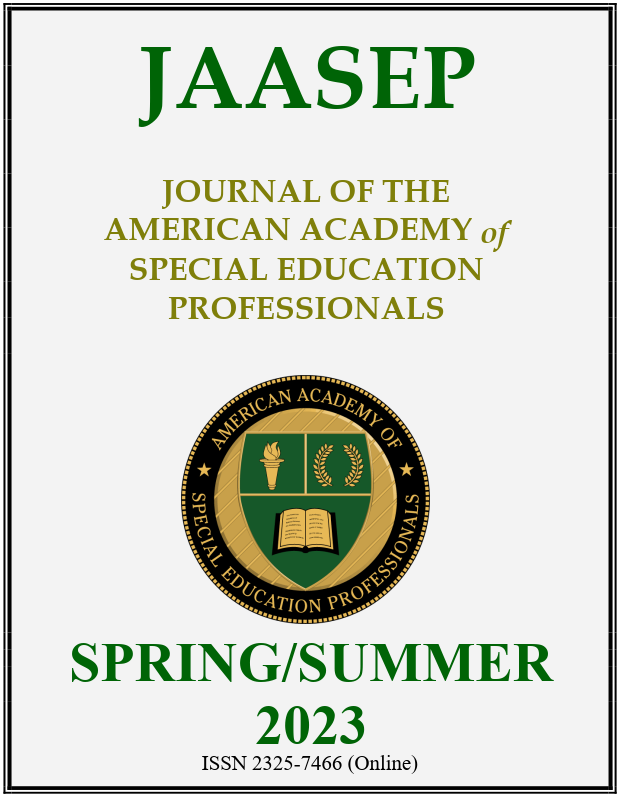Experiences of Special Education Teachers in New York State During COVID-19 Remote Instruction
Atiles, J. T., Almodóvar, M., Chavarría Vargas, A., Dias, M. J. A., & Zúñiga León, I. M. (2021). International responses to COVID-19: Challenges faced by early childhood professionals. European Early Childhood Education Research Journal, 29(1), 66–78. https://doi.org/10.1080/1350293X.2021.1872674 DOI: https://doi.org/10.1080/1350293X.2021.1872674
Berger, J. & Lê Van, K. (2018): Teacher professional identity as multidimensional: mapping its components and examining their associations with general pedagogical beliefs, Educational Studies. https://doi.org/10.1080/03055698.2018.1446324. DOI: https://doi.org/10.1080/03055698.2018.1446324
Burkett, J., & Reynolds, D. (2020). Pandemic policy preparedness: Unintentional student discrimination in the wake of COVID-19. School Leadership Review, 15(1), 1-23.
Centers for Disease Control and Prevention COVID-19 Response Team. Geographic differences in COVID-19 cases, deaths, and incidence—United States, February 12–April 7, 2020. Morbidity and Mortality Weekly Report 2020; 69:465–71. http://dx.doi.org/10.15585/mmwr.mm6915e4 DOI: https://doi.org/10.15585/mmwr.mm6915e4
Council for Exceptional Children (2015). What every special educator must know: Professional ethics and standards. CEC.
Davis, K. (2021). Teaching special education in the midst of COVID-19: Current conditions of delivering special education services during distance learning (Publication No. 1166) [Master’s thesis, California State University]. Electronic Theses, Projects, and Dissertations. https://scholarworks.lib.csusb.edu/etd/1166
Dobel, J.P. (1999), The ethics of resigning. Journal of Policy Analysis and Management, 18: 245-263. https://doi.org/10.1002/(SICI)1520-6688(199921)18:2<245::AID-PAM3>3.0.CO;2-H DOI: https://doi.org/10.1002/(SICI)1520-6688(199921)18:2<245::AID-PAM3>3.0.CO;2-H
Greenway, C. W., & Eaton, T. K. (2020). Parent experiences of home‐schooling children with special educational needs or disabilities during the coronavirus pandemic. British Journal of Special Education, 47(4), 510–535. https://doi.org/10.1111/1467-8578.12341 DOI: https://doi.org/10.1111/1467-8578.12341
Gudmundsdottir, G. B., & Hathoway, D. M. (2020). We always make it work: Teachers’ agency in the time of crisis. Journal of Technology and Teacher Education, 28(2), 239–250. Individuals with Disabilities Education Act, 20 U.S.C. § 1400 (2004). DOI: https://doi.org/10.70725/839558bffbol
Landicho, C. J. B. (2021). Changes, challenges, and opportunities in teaching senior high school earth science amidst the covid-19 pandemic. Journal of Learning and Teaching in Digital Age, 6(1), 55–57.
Mintrop, H. (2012). Bridging accountability obligations, professional values and (perceived) student needs with integrity. Journal of Educational Administration, 50(5), 695–726. DOI: https://doi.org/10.1108/09578231211249871
Mintrop, H. & Zane, R. (2017). When the achievement gap becomes high stakes for special education teachers: Facing a dilemma with integrity. Teachers College Record, 119, 1-39. DOI: https://doi.org/10.1177/016146811711900907
Mitchell, C., (2020, March 19). How will schools provide special education during the coronavirus crisis? Education Week. https://www-edweek-org.libproxy.albany.edu/teaching-learning/how-will-schools-provide-special-education-during-the-coronavirus-crisis/2020/03
New York State. (2020, May 4). Amid ongoing COVID-19 pandemic, Governor Cuomo outlines additional guidelines for when regions can re-open. Retrieved May 9, 2020. https://www.governor.ny.gov/news/amid-ongoing-covid-19-pandemic-governor-cuomo-outlines-additional-guidelines-when-regions-can
Ofsted (2021). Ofsted’s In-depth Study of Remote Education. (2021). Education Journal Review, 27(1), 45–88. Office of State Comptroller (2021, September). Disruption to Special Education Services: Closing the Gap on Learning Loss from COVID-19. https://www.osc.state.ny.us/files/reports/pdf/special-education-report.pdf
Schuck, R. K., & Lambert, R. (2020). Am I doing enough?: Special educators’ experiences with emergency remote teaching in Spring 2020. Education Sciences, 10(11):320. https://doi.org/10.3390/educsci10110320 DOI: https://doi.org/10.3390/educsci10110320
Waldron, H. (2017). What’s your teaching identity? Academic Study Kit.
Downloads
Article Information
- Article Type Articles
- Submitted May 10, 2023
- Published June 15, 2023
- Issue Spring/Summer 2023
- Section Articles
